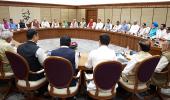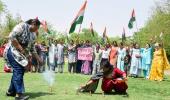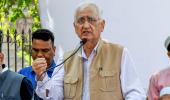When the country has been at war, the Opposition has buried its differences with the government, points out Aditi Phadnis.

Guns might have blazed on India's western border. But it is all quiet on the Parliament front.
The Opposition demand for a joint session of Parliament to hold the government accountable for intelligence and security failures that led to the Pahalgam killings appears to be on the back burner.
Lal Bihari Yadav, leader of the Opposition from the Samajwadi Party in the UP legislative council, is no longer saying the Pahalgam terrorist attack may have been 'carried out politically'.
Instead, the Opposition is rallying behind the government to a man and pledging full support to Operation Sindoor.
The Congress is planning to take out Jai Hind yatras from all state party headquarters to back the operation -- whether or not the government wants such a move.
'You push on ahead and we are with you in the decisions you take and are standing with the army,' said Congress President Mallikarjun Kharge after the all-party meeting, which was briefed by Defence Minister Rajnath Singh.
The bitterness over the suspension of parliamentarians and the low-level exchange of rhetoric between the government and Opposition on a variety of issues ranging from nepotism to corruption to patriotism are in the past.
Peace, however tenuous, has broken out between the government and the Opposition.
And this is the gratifying thing about India's democracy, with all its imperfections: That this has almost always been the case.
When the country has been at war, the Opposition has buried its differences with the government.
You only have to read parliamentary debates.
In 1961, Opposition leaders like Madhu Dandavate actually joined the war that led to the liberation of Goa.
In 1965 Pakistan attacked the Rann of Kutch and simultaneously launched Op Gibraltar in Kashmir.
During a day-long debate in the Rajya Sabha, socialists like Madhu Limaye and Kishan Pattanayak asked searching questions but Prime Minister Lal Bahadur Shastri was cheered by the entire House when he replied to the debate.

In 1971, after the war with Pakistan, leading to its surrender and the creation of Bangladesh, Atal Bihari Vajpayee's speech in the Lok Sabha as a member of the Jana Sangh, the precursor of the Bharatiya Janata Party, was stirring.
In the midst of high inflation, food shortages and challenges to the leadership of the Indira Gandhi-led Congress, it was the Opposition that bolstered the government's morale.
In the parliamentary debate that announced India was at war, only the Communist Party of India-Marxist refrained from personal praise for Indira Gandhi.
In his speech, Vajpayee said: 'The Prime Minister must now lead the country to total victory over the enemy. If the government wants to secure more powers to handle the situation, this party would not hesitate to accord its fullest cooperation,' adding, 'the country is not prepared to lose on the negotiation table, what our jawans have won in the battlefield ...
'We will not allow the status quo on the western front to return. This war must cure Pakistan's aggression, which keeps erupting every five years or so.'

Of course it didn't: Limited wars, asymmetric wars, and near wars would follow, like Operation Brasstacks, Operation Parakram, Operation Vijay, and, later, the attack in Uri and the 2019 air strikes at Balakot on terrorist bases inside Pakistan.
Some of these saw an ambivalent response from the Opposition.
In 2019 after the Balakot strikes, 21 political parties accused the Narendra Modi government of 'blatant politicisation of the sacrifices of the armed forces" and said "national security must transcend narrow political considerations'.
India's out-of-area operation in Sri Lanka, Operation Pawan, is not considered war at all, according to Chief of Defence Staff General Anil Chauhan, who told veterans of the Indian Peace-Keeping Forces last year in Dehradun: 'We have fought hundreds of operations; Op Pawan was only a minor operation.'
Maybe, but this operation met with a strong riposte from at least one section of the Opposition.

The strongest parliamentary criticism of the government was after the disastrous war with China in 1962.
In 1963, after ruling unchallenged for 16 years, Jawaharlal Nehru faced a no-confidence motion in the Lok Sabha, the first ever, on this.
It was moved by J B Kripalani and lasted nearly 22 hours over four days.
The debate saw a biting attack on Nehru from Ram Manohar Lohia, who had just become a Lok Sabha member.
Kripalani, a rebel Congressman, also asked India to revise Panchsheel and break diplomatic ties with China.
Nehru's response was measured and qualified. While welcoming more such tests of the government like the no-confidence motion, he said throwing away Panchsheel only because China had broken faith with it was a really bad idea.
And going to war with China was simply not an option.
Unlike other countries including Israel, where the government has been criticised by the Opposition and even allies for not going far enough in its military response, in India, war, even a limited one, has not been used by the Opposition as a tool to topple governments.
It may even have introduced an element of political consensus as is the case now.
Domestic political dissonance cannot be a factor when India plots an exit policy from the current confrontation.
An international clamour for de-escalation has already begun.
The Indian Opposition is not a part of it. The next steps are awaited.
Feature Presentation: Aslam Hunani/Rediff











